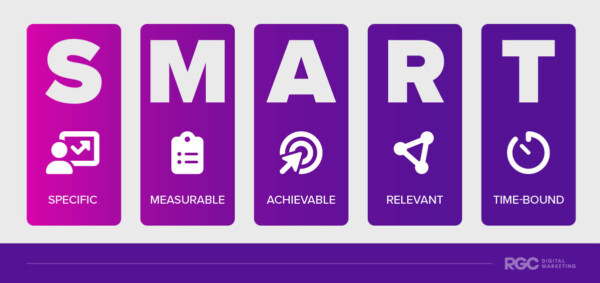SMART Goals In Digital Marketing

Table of Contents
- What Are SMART Goals?
- Breaking Down The SMART Criteria
- Importance Of SMART Goals In Digital Marketing
- Enhancing Campaign Clarity
- Improving Team Collaboration & Accountability
- Optimising Resource Allocation
- Implementing & Tracking SMART Goals In Digital Marketing
- Utilising Digital Marketing Tools
- Monitoring Progress & Making Adjustments
- Reporting & Analysing Results
- Transform Your Strategy: Start Setting SMART Goals Today!
Have you ever been driving through a tunnel and suddenly your GPS loses signal? You feel lost, unsure of the next turn, and every moment of uncertainty slows you down. Frustrating right?
The same goes for navigating digital marketing without clear, intentional goals. In a fast-paced, ever-changing landscape, having a reliable framework for your objectives is crucial. Just like a GPS recalibrating after exiting the tunnel, a SMART framework in building goals provides a way out of that rut.
What Are SMART Goals?
SMART goals, an acronym for Specific, Measurable, Achievable, Relevant, and Time-bound, are a powerful tool for setting clear and effective objectives. This framework was first introduced in 1981 by George T. Doran in his article “There’s a S.M.A.R.T. Way to Write Management’s Goals and Objectives.” Since then, SMART goals have become essential across various industries, including digital marketing. By using SMART goals, marketers can create well-defined targets that are easy to track, realistic, aligned with business objectives, and bound by a specific timeframe.

Breaking Down The SMART Criteria
Let’s dive deeper into each element of SMART goals to understand how they can benefit your digital marketing strategy.
Specific: A goal needs to be specific to provide clear direction. Instead of saying “increased website traffic,” a specific goal would be “increase website traffic by 20% through search engine optimisation and content marketing.” This clarity helps everyone involved understand exactly what is expected.
Measurable: Measurable goals include criteria for tracking progress. If you can’t measure it, you can manage it. For example, if your goal is to “gain more followers on social media,” make it measurable by saying, “gain 500 new followers on Instagram within the next three months.” This way, you can easily track your progress and know when you’ve achieved your goal.
Achievable: While it’s great to aim high, your goals should be realistic. Setting unattainable goals can lead to frustration and burnout. Ensure your goals are challenging yet achievable given your resources and time. For instance, aiming to “double your email list in six months” might be more realistic than trying to do it in one month.
Relevant: Your goals should align with your overall business objectives. If your company’s focus is on brand awareness, your marketing goals should reflect that. For example, “increase brand mentions by 30% in the next quarter” is a relevant goal if brand awareness is your priority.
Time-bound: Every goal needs a deadline. A time-bound goal helps create a sense of urgency and keeps you focused. Instead of saying “improve our email open rates,” set a deadline: “improve our email open rates by 15% within the next quarter.” This timeframe keeps everyone on track and motivated.
Importance Of SMART Goals In Digital Marketing
Enhancing Campaign Clarity
SMART goals provide a clear direction for your campaigns. They help digital marketers focus on specific outcomes, making it easier to track progress and make necessary adjustments. This clarity ensures that every action taken is aligned with the desired results, preventing wasted efforts.
Improving Team Collaboration & Accountability
When everyone knows the goals, team coordination improves. SMART goals foster a sense of accountability, as each team member understands their role and how it contributes to the overall success. This shared understanding enhances collaboration, leading to more cohesive and effective teamwork.
Optimising Resource Allocation
Efficient use of resources is key in digital marketing. SMART goals ensure time, budget, and tools are used effectively, leading to more cost-effective strategies and better returns on investment. By clearly defining what needs to be achieved and how, resources are allocated more strategically, maximising their impact.

Implementing & Tracking SMART Goals In Digital Marketing
Utilising Digital Marketing Tools
Digital marketing tools like Google Analytics, SEMrush, and HubSpot are essential for setting and tracking SMART goals. These tools provide valuable data on website traffic, keyword performance, and customer engagement, helping marketers create specific, measurable, achievable, relevant, and time-bound goals. With these insights, marketers can pinpoint what drives success and adjust their strategies accordingly.
Monitoring Progress & Making Adjustments
Regularly checking progress is crucial for success. By reviewing performance data, marketers can identify what’s working and what needs tweaking. Adjusting strategies based on these insights ensures that marketing efforts remain effective and aligned with SMART goals. This proactive approach helps in staying ahead of the competition and achieving desired outcomes.
Reporting & Analysing Results
Comprehensive reports help assess whether SMART goals are met. By analysing these reports, digital marketers can gain insights into their successes and areas for improvement. These findings are essential for refining future digital marketing strategies and achieving long-term success. Consistent reporting and analysis keep the team informed and focused on continuous improvement.
Transform Your Strategy: Start Setting SMART Goals Today!
SMART goals are a game-changer for digital marketing. They help you stay focused, measure progress, and achieve real results. By setting Specific, Measurable, Achievable, Relevant, and Time-bound goals, you’re not just throwing darts in the dark; you’re hitting the bullseye with precision. So, start today, refine your goals, and watch your digital marketing efforts soar to new heights. Remember, the SMART approach isn’t just about working harder—it’s about working smarter! Ready to see the difference? Let’s get started!


